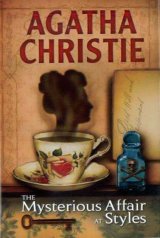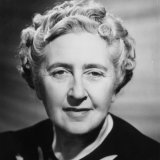The Mysterious Affair at Styles Page #9
The Mysterious Affair at Styles is a detective novel by British writer Agatha Christie. It was written in the middle of the First World War, in 1916, and first published by John Lane in the United States in October 1920 and in the United Kingdom by The Bodley Head on 21 January 1921.
“I do not mind telling you—though, as you know, it is not my habit to explain until the end is reached. The present contention is that Mrs. Inglethorp died of strychnine poisoning, presumably administered in her coffee.” “Yes?” “Well, what time was the coffee served?” “About eight o’clock.” “Therefore she drank it between then and half-past eight—certainly not much later. Well, strychnine is a fairly rapid poison. Its effects would be felt very soon, probably in about an hour. Yet, in Mrs. Inglethorp’s case, the symptoms do not manifest themselves until five o’clock the next morning: nine hours! But a heavy meal, taken at about the same time as the poison, might retard its effects, though hardly to that extent. Still, it is a possibility to be taken into account. But, according to you, she ate very little for supper, and yet the symptoms do not develop until early the next morning! Now that is a curious circumstance, my friend. Something may arise at the autopsy to explain it. In the meantime, remember it.” As we neared the house, John came out and met us. His face looked weary and haggard. “This is a very dreadful business, Monsieur Poirot,” he said. “Hastings has explained to you that we are anxious for no publicity?” “I comprehend perfectly.” “You see, it is only suspicion so far. We have nothing to go upon.” “Precisely. It is a matter of precaution only.” John turned to me, taking out his cigarette-case, and lighting a cigarette as he did so. “You know that fellow Inglethorp is back?” “Yes. I met him.” John flung the match into an adjacent flower bed, a proceeding which was too much for Poirot’s feelings. He retrieved it, and buried it neatly. “It’s jolly difficult to know how to treat him.” “That difficulty will not exist long,” pronounced Poirot quietly. John looked puzzled, not quite understanding the portent of this cryptic saying. He handed the two keys which Dr. Bauerstein had given him to me. “Show Monsieur Poirot everything he wants to see.” “The rooms are locked?” asked Poirot. “Dr. Bauerstein considered it advisable.” Poirot nodded thoughtfully. “Then he is very sure. Well, that simplifies matters for us.” We went up together to the room of the tragedy. For convenience I append a plan of the room and the principal articles of furniture in it. 02 Poirot locked the door on the inside, and proceeded to a minute inspection of the room. He darted from one object to the other with the agility of a grasshopper. I remained by the door, fearing to obliterate any clues. Poirot, however, did not seem grateful to me for my forbearance. “What have you, my friend,” he cried, “that you remain there like—how do you say it?—ah, yes, the stuck pig?” I explained that I was afraid of obliterating any foot-marks. “Foot-marks? But what an idea! There has already been practically an army in the room! What foot-marks are we likely to find? No, come here and aid me in my search. I will put down my little case until I need it.” He did so, on the round table by the window, but it was an ill-advised proceeding; for, the top of it being loose, it tilted up, and precipitated the despatch-case on the floor. “Eh voilà une table!” cried Poirot. “Ah, my friend, one may live in a big house and yet have no comfort.” After which piece of moralizing, he resumed his search. A small purple despatch-case, with a key in the lock, on the writing-table, engaged his attention for some time. He took out the key from the lock, and passed it to me to inspect. I saw nothing peculiar, however. It was an ordinary key of the Yale type, with a bit of twisted wire through the handle. Next, he examined the framework of the door we had broken in, assuring himself that the bolt had really been shot. Then he went to the door opposite leading into Cynthia’s room. That door was also bolted, as I had stated. However, he went to the length of unbolting it, and opening and shutting it several times; this he did with the utmost precaution against making any noise. Suddenly something in the bolt itself seemed to rivet his attention. He examined it carefully, and then, nimbly whipping out a pair of small forceps from his case, he drew out some minute particle which he carefully sealed up in a tiny envelope. On the chest of drawers there was a tray with a spirit lamp and a small saucepan on it. A small quantity of a dark fluid remained in the saucepan, and an empty cup and saucer that had been drunk out of stood near it. I wondered how I could have been so unobservant as to overlook this. Here was a clue worth having. Poirot delicately dipped his finger into liquid, and tasted it gingerly. He made a grimace. “Cocoa—with—I think—rum in it.” He passed on to the debris on the floor, where the table by the bed had been overturned. A reading-lamp, some books, matches, a bunch of keys, and the crushed fragments of a coffee-cup lay scattered about. “Ah, this is curious,” said Poirot. “I must confess that I see nothing particularly curious about it.” “You do not? Observe the lamp—the chimney is broken in two places; they lie there as they fell. But see, the coffee-cup is absolutely smashed to powder.” “Well,” I said wearily, “I suppose someone must have stepped on it.” “Exactly,” said Poirot, in an odd voice. “Someone stepped on it.” He rose from his knees, and walked slowly across to the mantelpiece, where he stood abstractedly fingering the ornaments, and straightening them—a trick of his when he was agitated. “Mon ami,” he said, turning to me, “somebody stepped on that cup, grinding it to powder, and the reason they did so was either because it contained strychnine or—which is far more serious—because it did not contain strychnine!” I made no reply. I was bewildered, but I knew that it was no good asking him to explain. In a moment or two he roused himself, and went on with his investigations. He picked up the bunch of keys from the floor, and twirling them round in his fingers finally selected one, very bright and shining, which he tried in the lock of the purple despatch-case. It fitted, and he opened the box, but after a moment’s hesitation, closed and relocked it, and slipped the bunch of keys, as well as the key that had originally stood in the lock, into his own pocket. “I have no authority to go through these papers. But it should be done—at once!” He then made a very careful examination of the drawers of the wash-stand. Crossing the room to the left-hand window, a round stain, hardly visible on the dark brown carpet, seemed to interest him particularly. He went down on his knees, examining it minutely—even going so far as to smell it. Finally, he poured a few drops of the cocoa into a test tube, sealing it up carefully. His next proceeding was to take out a little notebook. “We have found in this room,” he said, writing busily, “six points of interest. Shall I enumerate them, or will you?” “Oh, you,” I replied hastily. “Very well, then. One, a coffee-cup that has been ground into powder; two, a despatch-case with a key in the lock; three, a stain on the floor.”
Translation
Translate and read this book in other languages:
Select another language:
- - Select -
- 简体中文 (Chinese - Simplified)
- 繁體中文 (Chinese - Traditional)
- Español (Spanish)
- Esperanto (Esperanto)
- 日本語 (Japanese)
- Português (Portuguese)
- Deutsch (German)
- العربية (Arabic)
- Français (French)
- Русский (Russian)
- ಕನ್ನಡ (Kannada)
- 한국어 (Korean)
- עברית (Hebrew)
- Gaeilge (Irish)
- Українська (Ukrainian)
- اردو (Urdu)
- Magyar (Hungarian)
- मानक हिन्दी (Hindi)
- Indonesia (Indonesian)
- Italiano (Italian)
- தமிழ் (Tamil)
- Türkçe (Turkish)
- తెలుగు (Telugu)
- ภาษาไทย (Thai)
- Tiếng Việt (Vietnamese)
- Čeština (Czech)
- Polski (Polish)
- Bahasa Indonesia (Indonesian)
- Românește (Romanian)
- Nederlands (Dutch)
- Ελληνικά (Greek)
- Latinum (Latin)
- Svenska (Swedish)
- Dansk (Danish)
- Suomi (Finnish)
- فارسی (Persian)
- ייִדיש (Yiddish)
- հայերեն (Armenian)
- Norsk (Norwegian)
- English (English)
Citation
Use the citation below to add this book to your bibliography:
Style:MLAChicagoAPA
"The Mysterious Affair at Styles Books." Literature.com. STANDS4 LLC, 2025. Web. 31 Jan. 2025. <https://www.literature.com/book/the_mysterious_affair_at_styles_309>.








Discuss this The Mysterious Affair at Styles book with the community:
Report Comment
We're doing our best to make sure our content is useful, accurate and safe.
If by any chance you spot an inappropriate comment while navigating through our website please use this form to let us know, and we'll take care of it shortly.
Attachment
You need to be logged in to favorite.
Log In